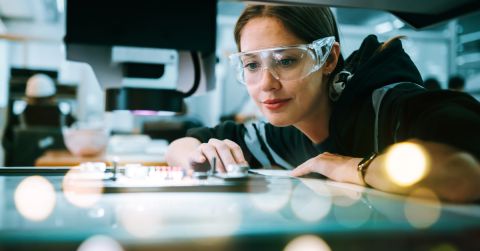Revolutionizing Energy Access w/ Ruben Walker of African Clean Energy

In this episode of Ctrl+Listen Podcast, James and Nora chat with Ruben Walker from African Clean Energy to explore a groundbreaking solution to the global energy crisis. African Clean Energy is on a mission to provide clean, efficient, and safe energy solutions for the 3 billion people with inadequate access to energy worldwide. Ruben delves into the innovative hybrid household energy system, breaking down the combustion technology behind it and its potential to transform lives. Discover the impact of this technology on climate, forest protection, health, and poverty conditions, as Ruben shares real-world examples and insights from the field. Learn how this system goes beyond providing energy by logging usage data and leveraging climate finance to make a lasting difference. Uncover the challenges and opportunities in the renewable energy sector, and gain a deeper understanding of the critical role carbon credits play in combating climate change. Ruben emphasizes the importance of reliable solutions and shares the exciting trends emerging in the renewable energy industry.
Listen to the Episode:
Watch the Episode:
Episode Highlights:
- Introduction to African Clean Energy
- Heightened awareness of energy use
- Long-term impacts of breathing in smoke
- EU funding and development challenges
- Connection between cooking/heating and poverty
Links and Resources:
Transcript:
James: Hey everyone this is James from the control Liston podcast brought to you by octopart today we have a special guest for you is Ruben Walker of the company African clean energy uh they do something a little different to the other guests we've had on as operating within the clean energy space with a very specific Mission uh thank you for coming on the show really happy to have you here.
Ruben: Yeah thanks for the invite it's my pleasure.
James: Anytime uh just to start out do you kind of want to explain a bit about the company uh what your objectives are and and what the product is that you're creating.
Ruben: Yeah um so it's a pretty giant problem that uh around the world some three billion people have inadequate access to energy um and energy access in that demographic tends to be fairly homogeneous around the planet it tends to be people want lighting uh most people have a mobile phone have you know some small electronics like radios Etc uh and then there's cooking um and potentially if it gets cold space heating uh and the the sort of important distinction there is that you know whereas lighting LED phones and and and and radios you could run off a bicycle Dynamo it's it's cooking and space heating that are actually really really energy intensive uh and so what African clean energy or Ace uh manufactures and distributes is uh this hybrid household Energy System behind me it consists of a combustion chamber sits a top a ventilator that drives air and therefore oxygen into the biomass fire so it's essentially as if you were to blow into a um into a barbecue to get it going but continuously so it gets hotter and hotter and hotter and hotter and what eventually happens is you get um a conversion of the biomass into gas so the hot gas floats to the top of the chamber and then Burns off as a gas and just like with a fossil gas flame uh that's a smokeless uh and very efficient and Powerful um process um because we need the ventilator uh the system has a lithium battery and that can then also power a couple of LED ports uh um uh which um USB ports sorry uh which can power LEDs uh and phone charging um and the small electronics uh and then what makes it additionally special is there's a microprocessor that sits on top of the electronics in the system and that uh logs the usage uh of each system so um when you then when that gets uploaded through a clever little integration we built through the Android mobile platform simply stated if you have our app on your Android phone and you charge that phone with our system uh there's a data exchange and uh we essentially see as if it were a virtual grid exactly how much these systems are being used that allows us to really precisely quantify what the individual impact is that each system has which can be really significant on climate Forest protection Health Women's empowerment um you know General poverty conditions um and we can also you know operationally act upon things that we're seeing so for instance if if we see a unit being used 14 hours a day will be curious and phone up and say are you a commercial user and is there anything we can do in augmenting our offering to you through sustainable fuels for instance and if we see that it's only being used one hour on Sunday we can phone up and ask you know it's a free country but are you experiencing some kind of problem is there a product Market Misfit how can we ensure that you're getting more out of this system.
Nora: So the the system it's you said it's right behind you?
Ruben: Yeah there's a couple over here in the in the cupboard.
Nora: Wow so it you can hold it?
Ruben: It's not heavy five kilos it's very portable
Nora: Wow, yeah I'm really struck by this idea of um of an energy system that heightens our awareness of our use and do you think the average person is aware of how much energy they use and like is that part of your um Mission or perhaps like an indirect result of your mission is for people to gain a greater awareness of how they consume energy?
Ruben: Yeah well so the Baseline conditions of our General sort of average customer tend to be that they're currently either using firewood in an open flame condition so essentially as if they're lighting a campfire in their own living room to cook on top of which as you can probably imagine has pretty dire consequences for the air quality in the home uh and that.
Nora: And also a lot of risk.
Ruben: Enormous. I mean the problem of indoor air pollution kills between 3 and 4 million people a year um mostly women and children because they tend to be the ones that are at home when the cooking is being done so this is absolutely stunning I mean this is just as that like non-controversial WHO figure.
Nora: And is the death occurring from uh the the fumes or actual fires?
Ruben: The majority of the death toll is related to long-term impact of breathing in smoke so you know just like smoking cigarettes is really bad for you and tends to kill you after 25 years um breathing in indoor air pollution from cooking in your childhood is incredibly bad for you and and might eventually kill you or give you COPD um so it's it's mostly that although there are actually quite a lot of deaths from things like you know cooking on paraffin uh or kerosene as James probably knows in South Africa that's a fairly massive cause of misery um in in tends to be in townships you know kerosene is incredibly dangerous and someone's kerosene stove will fall over and set the entire neighborhood on fire um and there's also some risk around you know monoxide poison poisoning and such uh but the majority of those millions of premature deaths are related to the long-term effect and not the sort of short-term dangers.
James: You mentioned that uh you had the sort of non-controversial side of it is that part of why you secured EU funding?
Ruben: So this is a problem that's not very well known with say the public um it's quite well known in the development sector unfortunately it has a bit of a reputation of being a bit of a basket case in terms of investment uh you know in need of Charity funding and such um and that's unfortunate because it's it's not actually I think it's one of the strongest business cases out there in in terms of you know development uh and this is related in part because of the the individual units potential to unlock climate Finance um you know a household using something like wood uh to to to cook on is emitting somewhere along the lines of two to four tons of CO2 per annum if you're using charcoal that actually gets multiplied because the way charcoal gets made is you essentially burn 6 kilos of wood into one kilo of charcoal and then use that so in terms of deforestation and and climate impact that's U it's incredibly significant um but uh so because of those impacts it is something that occasionally you can secure some funding for and in in in our case yes we we had some EU funding uh in South Africa we've had a few a few of these you know generally these kind of funding entities put out calls for uh proposal and and then we you know you can enter and and submit for funding but I would say there's not enough money uh to address this problem properly I mean again three billion people roughly half a billion uh to 3 or 4 billion households around the world suffer from this incredibly dangerous problem.
James: Right and why do you think uh basic Heating and cooking ability like this uh is so important to alleviate in communal poverty?
Ruben: It's universal. Everybody cooks um and you know in terms of negative impacts on life it's one of the biggest causes and again the fact that it has such a significant climate impact as well you know the estimates vary slightly but this problem causes more emissions than the airline industry um um so it's it's definitely not insignificant just imagine I mean it's essentially half a billion smokey columns going up every single evening um right so yeah we're talking literally a couple of billion tons of CO2 uh per year whereas you know the total emissions of humanity are around 50 billion so we're talking whole percentages of that um but the fact that that is the case GES puts an enormous opportunity uh into our hands to to leverage the reduction of those carbon emissions get those paid for um and that helps fund the business case uh of getting people to transition to sustainable energy.
Nora: How like is there um is there any resistance in that transition or like do are are people willing to adopt this new kind of system?
Ruben: Yes absolutely I mean I certainly think if you it depends on who you ask because a lot of people will say yes and there's all kinds of sort of cultural difficulties around getting people to transition and in part that's true but it's incumbent on us to actually provide people with a product that they want to use rather than just hope they'll do it for reasons of Environmental Protection or even or even health I mean you know our attitude is you basically need to solve for two things one is affordability and two is convenience and if you can do that nobody's going to you know say no no no leave me my firewood and charcoal um the reason people use those is not that they like them it's that they don't have any other alternatives.
James: I imagine there's also like a time sorry Nora there's also a timesaving aspect to this to people who don't have to like go collect firewood anymore or actually procure charcoal all that and keep the fire going like all throughout the day and night like it must be hugely time saving to people.
Ruben: Enormously yeah no I mean it's it's looking for firewood is something that often Falls to women and they will spend anywhere from one to three hours a day or sometimes a whole day per week uh getting that firewood but it's actually not only in the searching for fuel it's also in the cooking I mean if you want to boil five liters of water and you do it on an open campfire it can take you anywhere up to 45 minutes whereas on our system it's less than 10 .
James: Wow
Nora: Wow. Could you kind of break down for um for the non-engineer uh someone who doesn't know a lot about uh physics and how energy is uh moves and is made can you break down the combustion technology in a very simple way so people can understand how it works?
Ruben: Yeah so general open fire is essentially an incomplete combustion whenever you see smoke you can basically see components of whatever you're burning uh flying into the air and what you can do is by by driving up the the the temperature and the the Firepower um through through through forced forced gasification um forced air gasification which is what the ventilator does um you eventually get to a point where suddenly there's a Vol of oxygen and what happens is a gasification uh kicks in and then you get wood gas so your your wood turns into wood gas and that wood gas floats the the top of the chamber and then you burn the wood gas and then you can get a complete combustion um and that complete combustion is by virtue of being a complete combustion smokeless which means that you don't have to breathe in all the junk that's you know that's flying into to your home through in the form of smoke um but it's also because you're basically getting the maximum amount of energy out of your fuel it's very efficient and very powerful.
James: Do you think there's sort of a an issue with renewable energy where people kind of only look at the larger scale side of things and tend to overlook the day-to-day usage of stuff uh because I I know people seem to always talk about like um I guess massive fossil Fu fuel usage or Airlines or something like that but they don't talk about day-to-day consumption. Do you think that's a problem?
Ruben: Yeah I think misunderstanding about energy is an enormous problem and I mean it goes it it it's at all levels I mean including sort of policy and even in organizations that really should know better I mean I won't name any names but I once spoke to someone very senior at an a glob organization that whose reason data was to basically fix energy access for people who don't yet have it and this whole point about you know household energy demand for electricity is pretty modest generally speaking because LED lighting phone charging and a radio doesn't consume much and even if you're wealthier and you're starting to use TVs and fridges that's still pretty modest compared to what you need for for for thermal energy consumption like cooking and and and heating and he looked at me blankly and oh he never thought about it that way and my response is well how did you get this job then? um but that's you know that's it's it's definitely a problem because I don't think we that you know this problem would have this scope if there was better understanding of how straightforward it actually is and also how significant the the negative impact and you know as you well know there is an enormous sort of population growth specifically in the demographic that still uses wood and charcoal for their basic energy needs and so this is a problem that's getting exponentially worse um because that population is also urbanizing and in urbanizing in this context means that people go from from firewood and migrate towards charcoal which like I said is three or four times worse in terms of both climate and DeForest station um so it's not a problem that we've you know we've had at this scale for 100 years and it'll just bumble it's like on an exponential growth curve and I mean I just came back from Uganda Uganda is a very Green Country but funnily enough we have a factory in Northern Uganda just south of the city of Gulu and about a mile from from our Factory stand two incredibly tall trees that have some kind of local mythical meaning but those trees are about 50 to 60% higher than any other tree that you see in on the six-hour drive from from Gulu to campala the capital and you suddenly realize oh wow all the trees are gone everything that's here is basically either Plantation wood or very very young saplings and yeah that's pretty terrifying.
James: Yeah deforestation is crazy it's a huge problem it's the same it's the same when you travel through a lot of places in Southeast Asia it's just those those oil Palms looks like Forest but it's not Forest it's just Plantation as far as you can see.
Ruben: They'd be good for fuel though you could extract them and actually let it rewild again.
Nora: Have you ever thought about marketing this product to for instance like the unhoused population in a city like Los Angeles?
Ruben: We have absolutely no shortage of potential it being used yes absolutely be used I think would be incredibly popular I mean we have them all like they're they'd be excellent for you know if something like an earthquake strikes somewhere and all the infrastructure is gone uh refugee camps we have you know we have 700 users in the Chang Wali Refugee settlements in Western Uganda I mean there are just in Uganda approximately two million refugees for whom this is pretty much the biggest problem and it's also one of the major causes of social unrest with local uh local population you know when a refugee settlement starts all the trees start disappearing and people start getting really angry about that and so that's something we could tackle um did I mention that there are half a billion households that need this thing yesterday I mean yeah there's no shortage of potential customers what's been difficult actually in this sector is just fundraising it's just there are so few certainly professional investors um whose mandate covers this kind of sector um you know because obviously we operate in Risky geographies and in a sector that hasn't always had a stellar return for investors and um so yeah it's it's it's not the customer base I'm looking for it's the you know the the funding and the the scaleup.
James: Just a thought as well as someone who used to do multi-day hikes uh this would be a really great thing to be able to bring with you on something like that or camping or anything like that so like even just recreational uses is like a really eco-friendly way to actually be outdoors for multiple days and be able to do what you need to do.
Ruben: Yeah I mean it's it's not optimized for that because it's relatively heavy I mean 5 kilos for a camping stove is is pretty sizable but I mean if you just Chuck it in an RV or something like that then yeah it's perfect for that.
James: Right yeah just drive down to where you need to be unload it with the tents and there you go you're done you can just stay there.
Nora: Oh it's safer too.
Ruben: Yes yeah no that that's well yeah that would be great well that's an interesting point cuz safety of course like I said if if you knock over a kerosene stove the kerosene Runs Out catches fire and sets basically everything on fire whereas this thing the fuel is in the combustion chamber and if you look at it it is I mean it's you know somewhere between 700 and a thousand degrees C so it's really roaring but the moment you knock it over all the fuel falls out of the combustion chamber that is you know generating that power and suddenly it's just a couple of blowing Embers and it really can't set fire to much at all you'd have to be really unlucky to catch the curtains or something like that um so yeah it's very safe in that sense.
James: That's great for like high-risk fire zones so places like uh Australia Southern California that type of thing where you have those times of year where anything can set off a massive fire.
Ruben: Yeah yeah I mean you always have to be a little bit careful with things like sparks flying out I mean that that can still happen especially if you've got the fire roaring hot.
James: So we're coming up in time here so I just wanted to ask uh are there any trends that you've seen personally emerging in the renewable energy industry that have you excited?
Ruben: I mean I see our sector picking up which you know I I am excited about I'm excited about the potential for leveraging climate finance properly now this year has also seen enormous criticism of the concept of of carbon credits of carbon offsetting uh and a lot of that criticism is really valid uh because a lot of projects have just either not been robust or downright fraud adjacent but that doesn't mean that conceptually this isn't the most powerful tool that we have to battle climate change with it's not any individual technology if you ask me it is the fact that you can attach a monetary value to an externality like a ton of CO2 um and so if I can just put one thought out there it is do not throw the baby out with the bath water on this incredibly important tool that we have and you know carbon credits are incredibly powerful but you know they need to be robust and reliable you need to be able to count on the fact that a ton of CO2 is really a ton of CO2 but if it is this is how we fix both the energy access problem and and at least a significant percentage of of the climate change we inflict on the planet.
James: Fantastic and for oh um yeah.
Nora: One question that we are starting to ask our guests is if you imagine pre-COVID if you knew what you know now like what would you do differently?
Ruben: That's a good question because it hit us pretty hard um well we got somewhat lucky in in Co because we were until April of 2020 we were operating on a single Factory which was in lutu and in April we opened our second Factory which is in Cambodia and weirdly Cambodia remained pretty much Untouched by COVID until well into the second or third wave um and so even though lutu went into like hermetic lockdown you know there was no people going across the border there were no Goods going across the border that would have really knocked us out maybe permanently uh if we hadn't had this alternative uh Supply from our other new Factory um so I would have definitely told myself to press on with the opening of that um yeah other than that I mean ensure you have enough Capital to give yourself a decent cash flow Runway um because funding certainly became difficult in that in that period.
James: Well thanks again for coming on the show it's been really fascinating talking to you I think we all have a better understanding of the problem that you're facing and how you're trying to change that no yeah thank you for offering such insight into Solutions I feel inspired I appreciate that and until next time yeah and for anyone listening home just come back next time have another fascinating guest for you.








